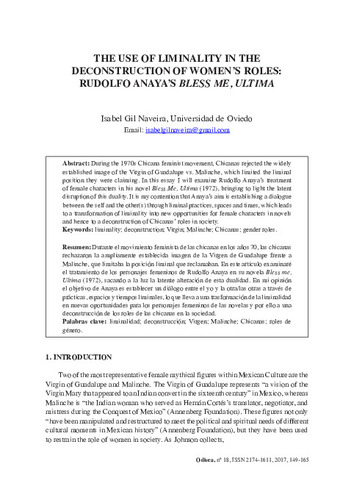The Use of Liminality in the Deconstruction of Women’s Roles: Rudolfo Anaya’s Bless me, Ultima
Autor(es) y otros:
Palabra(s) clave:
liminality; deconstruction; Virgin; Malinche; Chicanas; gender roles
Fecha de publicación:
Versión del editor:
Citación:
Descripción física:
Resumen:
During the 1970s Chicana feminist movement, Chicanas rejected the widely established image of the Virgin of Guadalupe vs. Malinche, which limited the liminal position they were claiming. In this essay I will examine Rudolfo Anaya’s treatment of female characters in his novel Bless Me, Ultima (1972), bringing to light the latent disruption of this duality. It is my contention that Anaya’s aim is establishing a dialogue between the self and the other(s) through liminal practices, spaces and times, which leads to a transformation of liminality into new opportunities for female characters in novels and hence to a deconstruction of Chicanas’ roles in society.
During the 1970s Chicana feminist movement, Chicanas rejected the widely established image of the Virgin of Guadalupe vs. Malinche, which limited the liminal position they were claiming. In this essay I will examine Rudolfo Anaya’s treatment of female characters in his novel Bless Me, Ultima (1972), bringing to light the latent disruption of this duality. It is my contention that Anaya’s aim is establishing a dialogue between the self and the other(s) through liminal practices, spaces and times, which leads to a transformation of liminality into new opportunities for female characters in novels and hence to a deconstruction of Chicanas’ roles in society.
Colecciones
- Artículos [37541]
- Filología Inglesa, Francesa y Alemana [590]
Ficheros en el ítem





